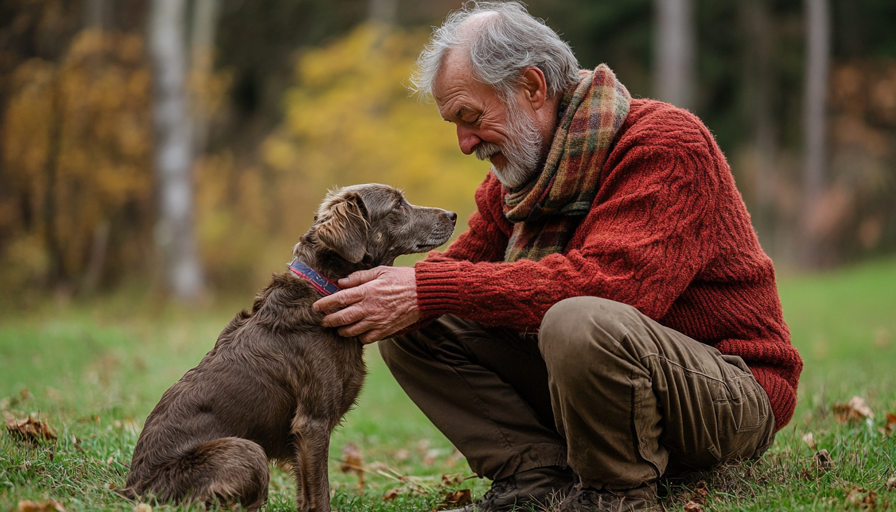Losing a Dog: Providing Support and Choosing Thoughtful Words
For many, a dog is more than just a pet—they’re a loyal companion, a source of unconditional love, and a cherished member of the family. When someone loses a dog, it can be an incredibly emotional and difficult time. Their absence leaves a void that’s deeply felt, often comparable to the loss of a close friend or relative. While you may want to offer comfort, knowing what to say and how to express sympathy can feel daunting.
This guide explores ways to support someone grieving the loss of their dog, offering heartfelt advice, meaningful words, and thoughtful gestures to help them navigate their sorrow.
Understanding the Loss of a Dog
To someone who’s never had a pet, it may be hard to understand why losing a dog can be so painful. But for pet owners, dogs often fill a unique role in their lives. They’re there for milestones, comfort during hard times, and moments of joy.
Dogs provide unconditional love without judgment, making their loss deeply personal. The grief experienced can be as intense as mourning the death of a human loved one, complete with feelings of loneliness, sadness, and even guilt. Understanding this dynamic is the first step in offering meaningful support.
How to Express Sympathy for Someone Who’s Lost a Dog
When comforting someone who has lost their dog, it’s important to approach the situation with empathy and sensitivity. Here are some ways to express your sympathy:
1. Acknowledge Their Loss
Simply acknowledging their grief can be a powerful way to show support. Avoid minimizing their feelings or saying things like, “It was just a dog,” which can come across as dismissive. Instead, acknowledge the depth of their bond.
What to say:
- “I’m so sorry for your loss. [Dog’s name] was such a special part of your life.”
- “I can only imagine how hard this must be for you. [Dog’s name] was truly loved.”
2. Share a Memory or Observation
If you knew their dog, share a fond memory or something you admired about them. This not only honors the dog’s memory but also reminds the grieving person of the joy their pet brought to others.
What to say:
- “I’ll always remember how [Dog’s name] used to wag their tail every time they saw me. They had such a happy spirit.”
- “Your bond with [Dog’s name] was so special. It was clear how much they loved you.”
3. Offer Specific Help
Grief can be overwhelming, and practical offers of help can be incredibly meaningful. Rather than saying, “Let me know if you need anything,” suggest specific ways you can assist.
Examples:
- “Would you like me to help pack up [Dog’s name]’s things when you’re ready?”
- “If you need someone to talk to or go for a walk with, I’m here.”
4. Provide a Listening Ear
Sometimes, the best thing you can do is simply be there to listen. Allow them to share their feelings, memories, or even tears without trying to fix their pain.
Words to Share: Sympathy Messages for the Loss of a Dog
Whether you’re writing a card, sending a text, or sharing your condolences in person, thoughtful words can make a difference. Here are some examples to inspire you:
- “I’m deeply sorry for your loss. [Dog’s name] was such a wonderful companion and will be missed dearly.”
- “Losing [Dog’s name] must be so painful. Please know I’m here for you in any way you need.”
- “Thinking of you during this difficult time. [Dog’s name] brought so much joy to everyone who knew them.”
- “May the love and memories you shared with [Dog’s name] bring you comfort and peace.”
- “Dogs leave paw prints on our hearts, and [Dog’s name] certainly left a mark on yours. Sending you love and support.”
Thoughtful Gestures to Support Someone Grieving the Loss of a Dog
Beyond words, actions can also speak volumes. Thoughtful gestures show you care and can help bring comfort during a difficult time.
1. Send a Sympathy Card
A handwritten note expressing your condolences can be deeply meaningful. Include a heartfelt message or a favorite memory of their dog.
2. Give a Memorial Gift
Consider giving a small gift to honor their dog’s memory. Ideas include:
- A framed photo of their dog.
- A personalized paw print ornament or keychain.
- A donation to an animal charity in the dog’s name.
3. Offer Practical Support
Grief can make daily tasks feel overwhelming. Offering to help with errands, meals, or even taking their other pets for a walk can be a kind and practical way to support them.
4. Suggest a Memorial Activity
Encourage them to celebrate their dog’s life in a way that feels meaningful. This could include planting a tree in their yard, creating a scrapbook of memories, or lighting a candle in remembrance.
Helping Children Cope with the Loss of a Dog
The loss of a dog can be especially challenging for children, who may be experiencing grief for the first time. Helping them understand and process their emotions is crucial.
1. Be Honest and Gentle
Use clear, age-appropriate language to explain what happened. Avoid euphemisms like “went to sleep,” which can confuse young children.
What to say:
- “Dogs don’t live as long as people, and [Dog’s name] passed away because they were very old/sick. It’s okay to feel sad, and it’s okay to talk about it.”
2. Encourage Expression
Give children opportunities to express their feelings through drawing, writing, or talking. Let them share memories and ask questions.
3. Include Them in Memorials
Involve children in creating a tribute, like drawing a picture of their dog, writing a letter, or helping plant a tree in their memory.
How to Honor the Memory of a Dog
Losing a dog doesn’t mean the love and bond you shared ends. Many people find comfort in honoring their dog’s memory through small acts or rituals.
1. Create a Memorial Space
Set up a small area in your home or garden with your dog’s photo, collar, or favorite toy. It can be a peaceful place to reflect on happy memories.
2. Volunteer or Donate
Pay tribute to your dog by supporting other animals in need. Volunteer at a local shelter or make a donation to an animal rescue organization in their name.
3. Share Their Story
Writing about your dog’s life and what they meant to you can be a cathartic way to keep their memory alive. Share their story with friends or on social media to celebrate their impact.
What Not to Say When Someone Loses a Dog
While well-intentioned, certain phrases can feel dismissive or hurtful to someone grieving their dog. Avoid saying things like:
- “It’s just a dog.”
- “You can always get another one.”
- “At least they’re not suffering anymore.”
- “It’s time to move on.”
Instead, focus on validating their feelings and acknowledging the depth of their loss.
Conclusion
Losing a dog is an emotional experience that leaves a lasting impact. Offering sympathy, sharing thoughtful words, and showing kindness can help someone feel supported and understood during their grief.
Whether it’s through a heartfelt message, a simple gesture, or just being there to listen, your compassion can make a difference. Dogs leave paw prints on our hearts, and by honoring their memory and the love they brought, we ensure they remain a cherished part of our lives forever.
If you have any questions, comments or according to you certain information is missing after reading this post, feel free to contact us via the contact form.
















